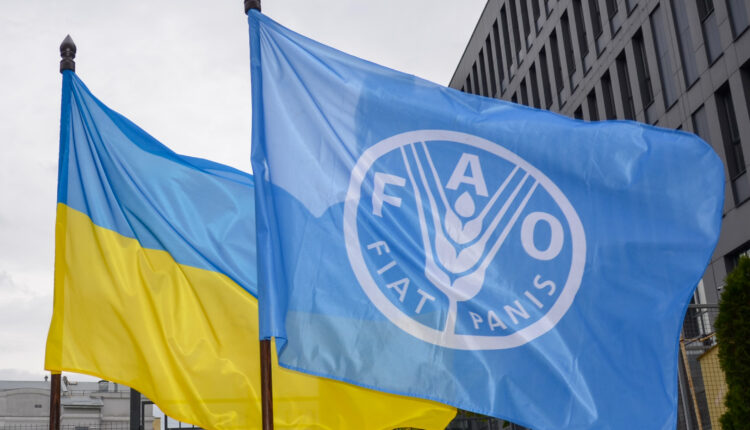The Food and Agriculture Organization of the United Nations (FAO) has reinforced its presence in Ukraine by signing an agreement with the Government to set up a Project Office that will facilitate and expand the provision of technical and humanitarian assistance to the country’s most vulnerable communities, especially in rural areas, writes SEEDS.
Ukraine joined FAO in 2003 and since 2015 the Organization has been operating in two strategic directions: emergency humanitarian response in conflict-affected oblasts and agricultural development across the whole country.
“Following the outbreak of the war in Ukraine in February 2022, FAO has scaled up its activities in the country to support agricultural production and food systems with the aim of protecting the food security of vulnerable households and communities across Ukraine,” said Laurent Thomas, FAO Deputy Director-General and signatory to the agreement on behalf of FAO. “This agreement will extend our cooperation in the country, increase Ukraine’s agricultural capacity and protect the food security of the most vulnerable Ukrainians, leaving no one behind.”
Yulia Svyrydenko, First Vice Prime Minister of Ukraine and Minister for Economic Development and Trade of Ukraine, and signatory to the agreement on behalf of the Government of Ukraine thanked FAO for help.
“On behalf of the Ukrainian people and our producers, I would like to thank FAO for the support that has been provided since the beginning of the large-scale invasion by Russia. The production and export capacities of the Ukrainian agricultural sector are being restored and the lives of the people to whom FAO provides assistance are also improving. I am convinced that, with the opening of the Project Office, the cooperation between FAO and Ukraine, which has been going on for many years, will gain new dynamics,” said she.
Disrupted supply chains and rising prices
The impacts of the war in Ukraine have severely disrupted the country’s agricultural production and food exports, jeopardizing both local and global food security.
FAO’s Humanitarian Response Update points to the growing evidence that food supply chain disruptions and increasing prices in conjunction with reduced incomes have significantly affected access to and the affordability of food resulting in growing dependence on food assistance. The prices of basic goods, including food, have increased significantly across the country, particularly in areas that have witnessed active fighting. More than half of the rural households surveyed by FAO reported that, over the past three months, food has accounted for over half of their total household expenditure.
Major difficulties expected in the coming months in relation to agricultural production include low returns from the sale of products, access to fertilizers and pesticides, access to fuel and electricity with which to power agricultural and farm equipment, and access to animal health products such as veterinary drugs, animal feed and feed additives. Storage for harvested produce is also in critically short supply.
FAO’s ongoing support to Ukraine
“FAO is actively supporting smallholders and rural families who play a vital role in local food value chains,” noted Raimund Jehle, FAO Regional Programme Leader. “Smallholder farmers are currently being supported with winter wheat seeds to enable them to sustain production levels for the 2023 harvesting season, as well as grain sleeves with which to ensure that harvests from this season are suitably stored and protected. FAO is also supporting rural households with animal feed, multipurpose cash assistance and vouchers with which to purchase other essential agricultural inputs and tools”.
FAO’s revised Rapid Response Plan (RRP) requires USD 115.4 million to assist almost one million people in rural Ukraine up to the end of 2022. FAO’s response includes providing crop and livestock inputs along with cash to support the most affected smallholder farmers and livestock holders to meet seasonal deadlines. This support will enable households to produce vegetables, cereal crops, milk, meat and eggs to feed their families.
To address the grain storage crisis, FAO has developed a Grain Storage Support Strategy (GSSS) requiring an additional $65 million. This extension to the RRP aims to deliver more than 4 million tonnes – or 25 percent of the estimated overall need – of grain storage capacity in Ukraine. The Strategy also includes the support of the State Service of Ukraine on Food Safety and Consumer Protection by strengthening government capacity for food commodity testing and certifications necessary for export at border facilities.
To date, FAO has raised almost $80 million against the combined total requirement of around $180 million under the RRP and GSSS. Additional resources are urgently needed to support vulnerable rural households, particularly in preparation for the approaching winter season.
Головні новини Seeds та агроідеї для зростання вашого бізнесу в Telegram Facebook InstagramYoutube та Підписуйтесь!



